Louise O'Neill: Transgender people deserve safety, healthcare and recognition

Louise O'Neill. Photo: Cathal Noonan
In her speech after winning Artist of the Year at the newly gender-neutral Brit Awards, Adele said: “I understand why the name of this award has changed but I really love being a woman and being a female artist.”
A fairly innocuous comment, one might have thought. Not to Fox News and other right-wing outlets who gleefully reported on the ‘backlash’ against the singer, claiming social media users were criticising Adele’s speech as ‘anti trans’.
Fox News proceeded to round up … eh, two tweets calling her a TERF (trans exclusionary radical feminist), the second of which was written by a woman who declares herself Radfem and Gender Critical in her bio. All in all, a storm in a teacup.
No trans person I know, nor anyone who considers themselves an ally, would take any notice of Adele’s speech; primarily because we don’t believe the act of declaring yourself a woman can be anti-trans. Trans women are women.
It’s reminiscent of the outcry over Minnie Mouse’s new polka dot pantsuit (“they’re taking all of these things that nobody was offended by,” Candace Owens raged on Fox News, “… and feel they have to get rid of them and destroy them … they are trying to destroy the fabrics of our society, pretending there’s issues,”) or the decision to take away the Green M&M’s white go-go boots and fluttering eyelashes to make her more “progressive”. (“Will M&Ms still melt in your hands if they identify as trans?” a Fox presenter asked and don’t worry, I don’t understand what point he was attempting to make either.)
The whole furore feels like yet another attempt to discredit the trans community, to make them seem ridiculous and demanding. As if trans people won’t rest until every beloved cartoon figure — and Santa, of course — identifies as non-binary.
I was reminded of a speech the author and activist, Juno Dawson, gave at a London protest in 2020, in which she said there were three things trans and non-binary people needed.
“I think it’s simple,” she said. “First of all, we want safety … second of all, we want healthcare … and last of all, we need a simple and easy system to be able to apply for legal recognition.”
Safety, healthcare, and recognition. Is that so much to ask for? Well, apparently it is because as outlined in a recent Vice article, an unpublished guidance pack from the EHRC (Britain’s equalities watchdog) advised businesses and other organisations to “protect women” by banning trans people from single-sex spaces such as bathrooms and changing spaces unless they had a Gender Recognition Certificate, which less than 1% of trans people in the UK do.
To the contrary, according to a study carried out on LGBTQ teenagers in 2019 (and subsequently published in Pediatrics journal), it was trans students in schools with bathroom restrictions that were at the higher risk of sexual assault, with one in four students reporting sexual violence in the previous 12 months.
BUT whenever you present these facts to opponents of more inclusive spaces, they often respond by listing the very few cases of trans people raping and harming women in single-sex jails and bathrooms. And while those stories are utterly devastating, they cannot be used to punish an already marginalised community.
Consider what it would sound like if you applied the same logic to different circumstances. If you said, this one lesbian couple abused their adopted child, so now we will not allow any other lesbian couples to adopt ever again.
Or if you said, well, this white Irish man attacked a Polish woman in a park so now we must ban white Irish men from every park in the country. Doesn’t that strike you as nonsensical? Even discriminatory? A violation of human rights, one could argue.
The insistence that any of this is an immutable fact of biology seems misguided to me. If that is true, how do we explain babies who are born intersex? Intersexuality has been found in the animal world, too, showing up in grizzly and polar bears, as well as baboons, deer, moose, buffalo, and kangaroo.
Even as far back as 1999, a book called Biological Exuberance detailed that more than 50 species of coral-reef fish possessed the ability to change their sexual organs from male to female.
There is so still so much that we must learn about the difference between sex and gender, but in the meantime, I don’t think it’s too much to hope for that we treat trans and non-binary people fairly.
To agree they deserve those three things: Safety, healthcare, and recognition.
Celebrity Memoir Book Club is my new favourite podcast. Two comedians, Ashley and Claire, dissect a new memoir every week with razor-sharp wit.
In Love in Colour, Bolu Babalola retells mythical tales from around the world. It’s a beautiful collection.



